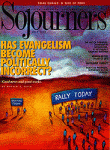The massive civil rights March on Washington, D.C., in April was a chance for many gay and lesbian Christians not only to take a public stand for human rights but also to embrace openly their spirituality and "demand a right to God."
Gay and lesbian Christians often feel "very isolated and very alone" in their churches, and the march was "one place where people could come and participate with a large group of like people," according to Christian Yoder, former coordinator of the Brethren/Mennonite Council for Lesbian and Gay Concerns, which sponsored a gathering for Mennonites and Brethren the night before the march--one of many religious events during the weekend. For many people, Yoder said, the weekend was "a real important act of self-affirmation, and it was important for people to participate with their church group."
For some participants, the march was simply an opportunity to proclaim their faith, even in the face of those who would condemn them. Candas Barnes, a member of Washington, D.C.'s Faith Temple, said she took part in the events "to remind people that even though the mainstream churches have tried to steal God from us, to tell us that God doesn't want us, in fact the word of God says that whosoever believes in Jesus will have eternal life."
Barnes, who plans to enter Howard University Divinity School next year, said that although she didn't choose her sexuality--"No one with any semblance of sanity would choose the life of homosexuality!"--she feels "blessed to know that I've been given who I am as a gift." She added, "I choose to find peace in who I am, and use the peace I've found to help others to know God. That's the commission for every Christian: to help spread the gospel. I want to make sure that's communicated in particular to African-American gay and lesbian people."
As the marchers proceeded down Pennsylvania Avenue from the White House toward the Capitol building, a small group of people from Westboro Baptist Church in Topeka, Kansas, met them with signs proclaiming "Gods Hates Fags" and "Queers Burn in Hell." A member of the group said they picketed "fag funerals" and other events around the country because they oppose gay and lesbian civil rights, which they call "damnable laws sure to hasten America's doom."
Rev. Steve Preston of the Southern California-based Evangelicals Together Inc. said he was "saddened" by the wrathful rhetoric of the fundamentalists. "There's no love in those signs," Preston said, "and Jesus talked about love--especially between disciples; we're to love as he loved." Preston said such hate-filled messages from members of the straight church made the job of evangelism among gays and lesbians much more difficult.
"Unfortunately, it reflects negatively on what people think of God," Preston said. "Too many people in our community have their view of God distorted by people like this. It puts roadblocks for the Holy Spirit."
Preston decried the media's tendency to focus on fringe elements of the gay and lesbian community and render gay and lesbian Christians virtually invisible. Sometimes, Preston said, it seems "they want to believe the worst. Anyone with eyes to see can see the incredible diversity of this community, and the incredible love. There are bad things in every human community. That doesn't disqualify the good, or make all [members of the community] bad."
For some marchers, going public was at heart a spiritual issue. "I had to reconcile my spirituality before I could come out," Kris Haugen, a United Church of Christ member from Lacey, Washington, told Sojourners. "I had to come to the realization, in a very personal way, that God is a loving God."
Jim Rice is editor of Sojourners.

Got something to say about what you're reading? We value your feedback!
